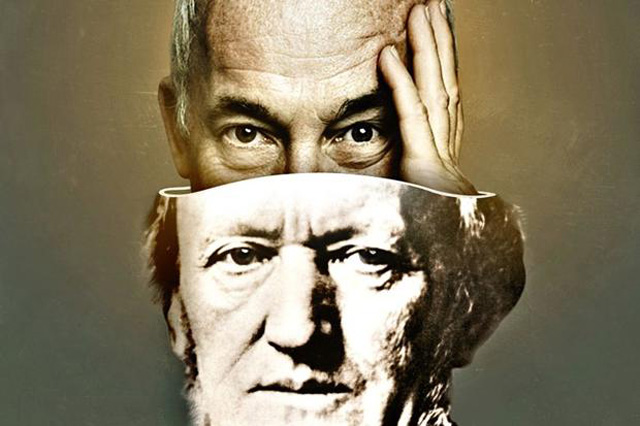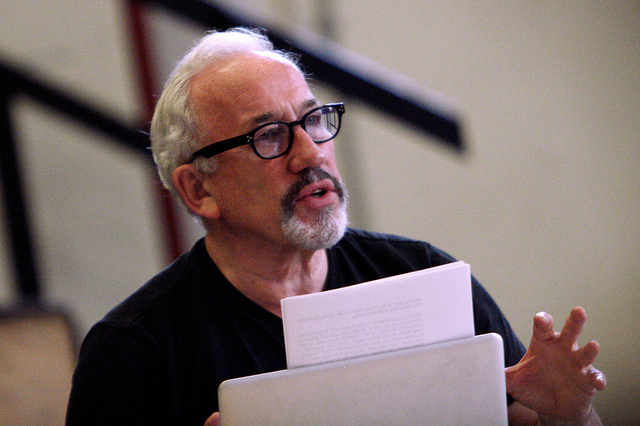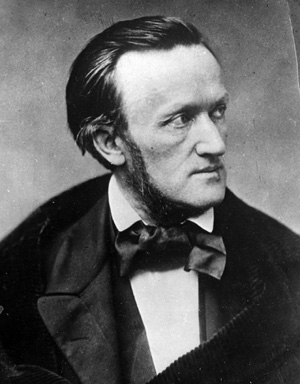Do you remember that one professor at university? The one who could have you totally glued for an entire lecture without reading any notes and reminding you why you were even studying in the first place? Then mix that lecturer with the most entertaining and erudite after-dinner speaker you’ve ever heard, and you’ve got Simon Callow on Wagner.

To mark the bicentennial year of Richard Wagner’s birth, the Deloitte Ignite Festival is celebrating the composer with a set of performances, films, art installations and so on, curated by Stephen Fry. As part of this, Simon Callow has written and performs a one-man show exploring the world of Wagner, the man, entitled Inside Wagner’s Head. In the Royal Opera House’s Linbury Studio, Callow examines Wagner’s history whilst delving into his psyche, attempting to understand what made him tick and how he came to produce such momentous, if divisive, works and opinions.
Wagner is not everybody’s cup of tea, and even if you quite like the taste of a sip, polishing off an entire teapot can be a daunting task – one that has scared many people off. Rossini, a contemporary of the composer’s, quipped: “Wagner has beautiful moments, and awful quarters of an hour.” With the Ring Cycle (his legendary collection of four operas) racking up a good 15 hours, investing in Wagner is consciously to devote a chunk of your life to him.Yet people do. This is how Callow introduces his subject, making a bloody good point: musicians, scholars and general fanatics alike are impelled not just to listen to his music over and over again, but to debate and dissect it to exhaustion. Even those who do not like Wagner seem unable to dismiss the composer, as they might others, since his music engenders a unique vehemence of emotion; a bit like Marmite, you either love Wagner or you hate him and, if the latter, what makes him so special?

There’s something about Wagner. He was a character, to say the least, and not a particularly likeable one. He was brutally inconsiderate to his first wife, had innumerable affairs with wives of his friends and benefactors, was fiercely anti-Semitic, butted into politics as he wished, was exiled from his country on several occasions, and generally said and did whatever he liked. He was utterly driven, taking whatever measures he deemed necessary to help his art, and his passions spanned philosophy, politics and literature, too, upon which he made a marked impression. By the time of his death in 1883, he had changed the landscape not just of opera but of music overall, and his legacy lives on today.
Simon Callow – already a bit of a buff on the subject – has done a sterling job of drawing together the complicated, unlikely, and downright baffling elements of Wagner’s life and intertwining them, chronologically, with his musical works. Wagner’s motivations, his rationales, his overwhelming hunger for art are painstakingly explained here in an empathetic yet removed manner. Callow is visibly moved by the excerpts that accompany his words, which is perhaps what enables him to produce this shrewd, enlightening and wryly comical portrait of the man who created such inimitable sounds.
 Directed by Simon Stokes, Callow is surrounded by a bizarre collection of incidental props (including birdcages, swords, a Brunhilde helmet and a piano propped up on old scores), which are casually drawn upon as gentle intimations of Wagner’s states of mind and inspirations. Musical excerpts are accompanied by projections onto the back wall and the lights are occasionally dimmed for effect but, otherwise, there is little to distract from Callow himself, who simply strolls on and starts talking.
Directed by Simon Stokes, Callow is surrounded by a bizarre collection of incidental props (including birdcages, swords, a Brunhilde helmet and a piano propped up on old scores), which are casually drawn upon as gentle intimations of Wagner’s states of mind and inspirations. Musical excerpts are accompanied by projections onto the back wall and the lights are occasionally dimmed for effect but, otherwise, there is little to distract from Callow himself, who simply strolls on and starts talking.
So what was in Wagner’s head? “All sorts of things,” says Callow, “some noble and some very nasty, were in there.” This is a warts and all exploration of one of the most renowned composers of all time. It is not a lecture in musical theory, (though Callow’s musical appreciation creates a backbone for his historical knowledge), and so the play will appeal to anyone who is in the least bit curious about the composer. Callow is evidently gifted at performing in similar one-man shows (he has portrayed Oscar Wilde, Charles Dickens and Shakespeare in the past) but to have actually written such a piece as well is astonishing. I feel decidedly inferior now, but beyond privileged to have experienced Inside Wagner’s Head.
Inside Wagner’s Head at the Linbury Studio at the Royal Opera House, Covent Garden, London, until Saturday 28th September 2013. For more information and to purchase tickets visit the website.




1 Comment
This is a wonderful review and makes going to see it almost compulsive. Must go and book my ticket!